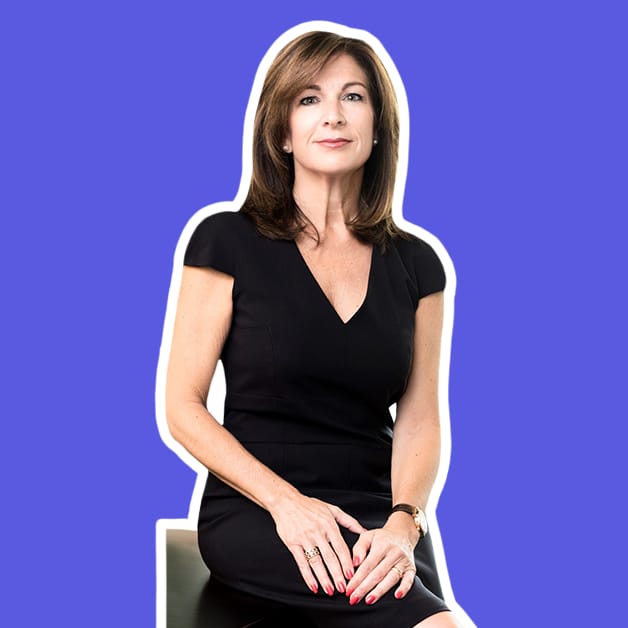Arguing about money is your everyday life. What does that do to your relationship with money?
Basically, I can define myself well. Nevertheless, my work and my experiences encouraged me early on in my principle of always being professionally and financially independent.
So you stood on your own feet early on?
I come from a relatively humble background. We were three sisters, my father was a teacher and my mother a housewife. We had everything we needed but didn't live in abundance. I left home when I was 19 to study. I always worked during my studies, also because I had to finance a large part of my life. I had little money. When I started working as a lawyer after graduating and earning a decent living, I savored it and spent most of it straight away. When I had let off steam, reason came and I used the money very consciously again.
What does money mean to you?
It gives me security and a certain amount of freedom. It's a relief when you don't have to turn over every penny.
Often it's only in conversation with me that many people realize how little they took care of their finances during their marriage.
When did you fight over money yourself?
Never. I've never had a situation where someone owed me money and didn't pay it back or vice versa.
Because as a lawyer you always arranged everything?
Honestly yes. My husband and I also have our finances clearly arranged and are very independent. 98 percent is separate. We have our own accounts, credit cards, and expenses. We have agreed on the small common part of the expenses. It is important to me to have my finances under control and to be informed about my financial situation.
Most women would rather talk about their own death than money. It seems it's different for you.
Money is not a taboo subject for me, but an essential part of our lives. It's just part of it. If money were taboo for me, I wouldn't be able to do my job. I have to ask my clients very specifically about their financial circumstances.
What do you experience with your clients? How shameful is the topic?
I experience my clients as very transparent. In conversations with women, however, it often happens that they cannot answer my questions because they simply do not know about their partner's financial situation. It is often only in conversation with me that many people realize how little they took care of their finances during their marriage. For example, many women never look at a tax return and simply sign it. Some don't even know what their partner earns.
Making sensible provisions for your pension. But with a return. That is possible. We are convinced that responsible use of your money creates long-term value, in line with our vision "Close the Gaps". If you are gainfully employed, you can additionally secure yourself financially with elleXX 3a, invest for the long term and thus save taxes.
Does that shock or annoy you?
Neither nor. But I can't understand why people aren't interested in it. Finances are an essential part of our life and our partnerships - not only in the case of a divorce. It's also possible that your partner could have an accident.
When it comes to divorce, money is a major issue. Why is that?
Divorce is about the question of livelihood for both parties. One issue is maintenance for the partner and for the children. It tends to be like this: the person who has to pay maintenance wants to give less – and the person with maintenance claims would rather receive more. Furthermore, it is about property law: If there is no marriage contract, it must be determined what a couple or family owns and what the distribution should look like. In addition, when you get divorced, your expenses increase. Suddenly you have to finance two households. However, there is not necessarily more money available. All of this offers potential for controversy.
Why do couples try to hurt each other over money?
A divorce is not only a legal act. It's also emotional. If one side is injured, for example through the partner's relationships with others, the injured side tries to compensate for the pain with money. This happens especially when you can no longer hurt the other person in any other way because they have left the relationship emotionally. According to the motto: The more he or she has to pay, the more it hurts. Money is often the only leverage in such cases.
Can money heal wounds?
No. But money can ease the pain. A separation always destroys a life plan. You have to reorient yourself. If the financial situation is right, it is easier to implement a new life plan. For example, in the form of training or further education. In such cases, money helps. However, if someone is completely embittered by a divorce, the generosity of their partner is of no use either.
I believe that you shouldn't live off the sustenance. You should have your own earnings.
How much does a divorce cost?
That cannot be said in general terms. If a couple agrees and I can just write a convention, a divorce might cost 1000 francs plus court costs.
What if it's not that easy?
If everything is disputed, from matrimonial property rights to maintenance rights to the allocation of children, a process can drag on for years. I had cases where it took nine years for the first instance to reach a verdict. Such legally complex and highly contentious divorces are very expensive.
How expensive?
In such long-term cases, the fee can amount to CHF 150,000 or more. Add to that the court costs.
How much is your hour?
300 francs.
Have you never had trouble charging for your performance?
No, I never had. I always try to do my best for my clients. I believe my work has value and deserves payment.
When there is a will to separate, finances are not an obstacle.
Have you already experienced that couples could not afford or did not want to divorce?
Not yet. If there is a will to separate, finances are not an obstacle. It must also be said that people without means have the opportunity to apply for free litigation and legal assistance. This means that the state bears the costs. However, you have to pay them back as soon as you get money again.
The pandemic has been a challenge for many families. How did that affect your business?
On the one hand, there are many separations. On the other hand, people have a much shorter fuse. This has increased the burden and stress in the procedures. The mood has become more unforgiving.
Who talked to you about money at home?
My mother. Although she did not work, she managed the family's money.
What values did she pass on to you?
We were very cost-conscious. Before making any purchases, we carefully considered whether we really needed them. We have never lived beyond our means. Our guiding principle was: You can only spend money when you have earned it.
Do you still stick to this principle?
Yes. I believe that you shouldn't live off the sustenance, but rather the earnings.
Material or status symbols interest me only to a limited extent.
How did you earn your first franc?
I wanted a moped when I was 13. Of course, that wasn't financially possible. So I had to work for it.
What did you do?
To find a job, I put up a note at Migros. A pregnant woman who had broken her foot responded to the ad. I was supposed to help her around the house for two weeks. We agreed on an hourly wage of six francs. I cleaned the house from top to bottom, carried out all her requests, and even swept the tiles and grout in the bathroom with a toothbrush. When the two weeks were up, she simply said she was only paying me half wages.
What?!
She even said I was lucky she was paying me at all. After all, I wouldn't have a written contract. That could hardly be surpassed in meanness. I was a 13-year-old girl and I couldn't help it!
Of course, it wasn’t enough for the moped either.
No, after the summer holidays I started tutoring a first-grader and saved the money that way. I will never forget this story.
What are you teaching your daughter about money?
It is important to my husband and me that she knows that you have to do something for money yourself. She should learn to stand on her own two feet. Having money doesn't come naturally, and she should know that having more means than others comes with a certain responsibility. She is 17, goes to high school, and gets pocket money. She has to pay for certain things. At the age of 14, she also worked in the kitchen in a restaurant so that she could see what the reality was like for others.
Sexism, bullying, wage inequality in the workplace? Absolute no-goes, yet many women put up with it because they fear high legal fees. This has to stop. It is time for a new kind of legal protection insurance by women for women. On where you get immediate help, sensitive legal advice, and a lawyer of your choice.
And in women's groups, is money an issue?
In my circle of friends, we don't talk about money very often. Of course, we sometimes talk about costs, taxes, and other expenses. There we are also relatively open. Due to age, however, we are currently talking more and more about our pension situation and financial provision.
What does it look like there? have you invested?
I have a third pillar and invested the money. I also have a share account and a savings account.
What are you saving for?
I'm not saving for a Hermès handbag or anything. Material or status symbols interest me only to a limited extent. Experiences and memories are more important to me. I like to travel. Of course, I have certain reserves, because you never know what will happen in life. I run a company. If I suddenly can no longer work, I still have to be able to cover costs for a certain period of time. Also, I have something on the side for my retirement.







